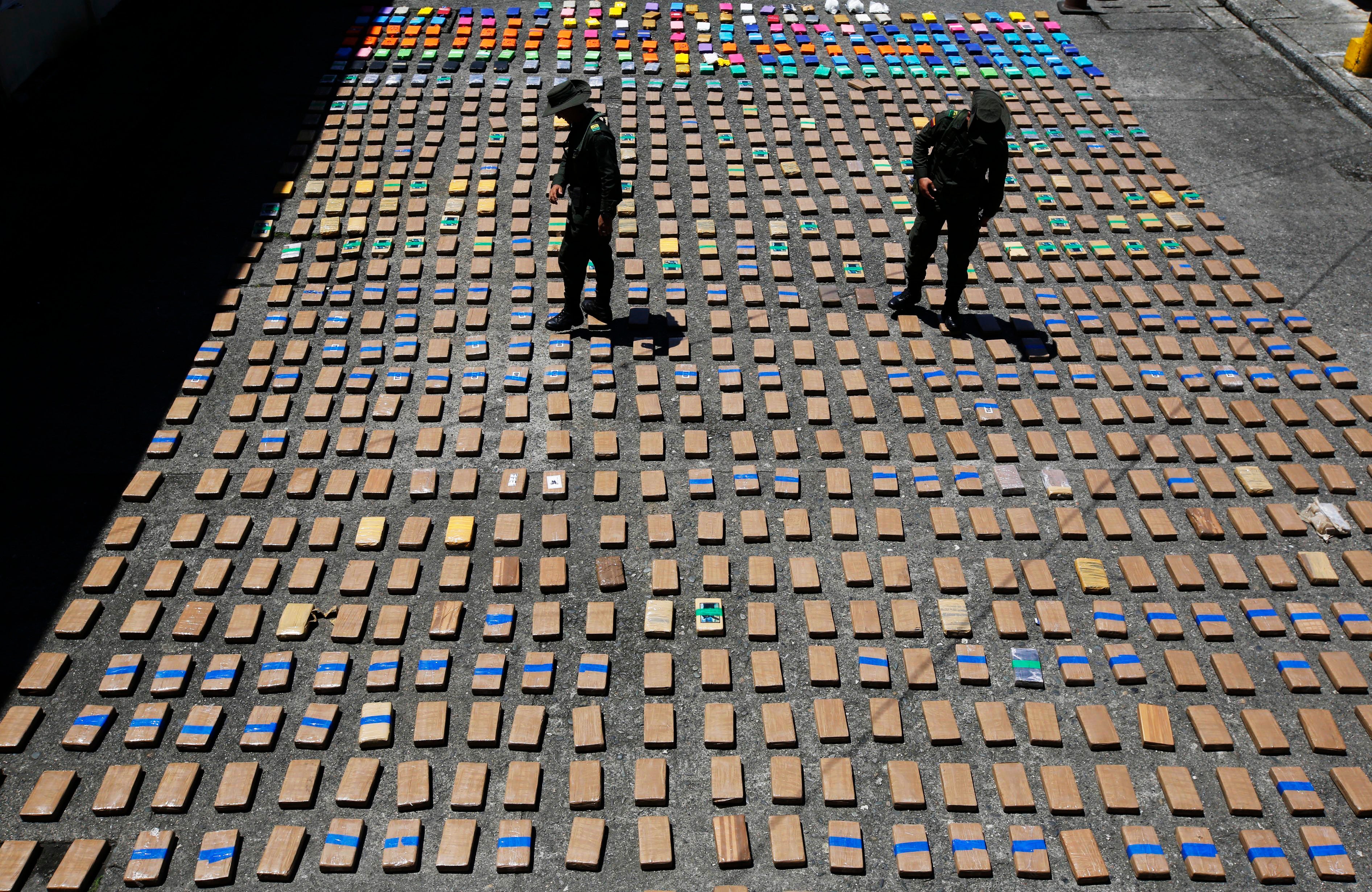Colombian cop who ran squad vetted by DEA pleads guilty
A Colombian national police officer who was part of an elite unit that worked closely with U.S. anti-narcotics agents has pleaded guilty to charges he betrayed the Drug Enforcement Administration to the same traffickers they were jointly fighting

Your support helps us to tell the story
From reproductive rights to climate change to Big Tech, The Independent is on the ground when the story is developing. Whether it's investigating the financials of Elon Musk's pro-Trump PAC or producing our latest documentary, 'The A Word', which shines a light on the American women fighting for reproductive rights, we know how important it is to parse out the facts from the messaging.
At such a critical moment in US history, we need reporters on the ground. Your donation allows us to keep sending journalists to speak to both sides of the story.
The Independent is trusted by Americans across the entire political spectrum. And unlike many other quality news outlets, we choose not to lock Americans out of our reporting and analysis with paywalls. We believe quality journalism should be available to everyone, paid for by those who can afford it.
Your support makes all the difference.A Colombian police captain who oversaw a unit that worked closely with U.S. anti-narcotics agents has pleaded guilty to charges that he sought to betray the Drug Enforcement Administration to the same traffickers they were jointly fighting.
Juan Pablo Mosquera changed his plea in Miami federal court Wednesday just as he was set to go on trial on two counts of obstructing justice.
Mosquera's 2018 arrest and subsequent extradition to the U.S. was another overseas embarrassment for the U.S. Drug Enforcement Administration, which has grappled for years with corrupt cops and deadly leaks by foreign law enforcement units it trains and supports.
He was assigned to a vetted unit overseen by the DEA s “Sensitive Investigative Unit,” or SIU, the gold standard for its partnerships abroad.
Mosquera was accused of trying to sell information about what he thought was an impending narcotics indictment against an American who had ditched probation decades earlier.
According to a three-page proffer accompanying Mosquera's plea, a relative of the 37-year-old police officer put him in contact with Juan Carlos Dávila-Bonilla, a Colombian who was previously twice convicted of distributing cocaine in Germany and Italy
The two met near the Colombian city of Cali in 2018 and Mosquera showed Dávila-Bonilla text messages and shared with him information about a DEA investigation into an American, identified in court papers only by his initials P.L., who was wanted on a warrant for fleeing custody in Arkansas in the 1990s.
When DEA agents learned that Mosquera and Dávila-Bonilla attempted to sell information about the probe they traveled to Cali to meet with Mosquera and falsely advised him that an indictment and extradition order against P.L. were forthcoming in Miami.
“Shortly after learning this information, Mosquera advised Dávila-Bonilla that P.L. was ‘hot,'" the former police officer said in his proffer.
Less than a week later, Dávila-Bonilla was recorded on a phone call with someone he thought was a drug-trafficking associate of P.L. but in reality was a DEA confidential source telling him that the Miami extradition request was imminent and that the American should leave Colombia.
P.L. was not ever named in a Miami narcotics indictment, according to Mosquera's proffer, although his record for ditching probation appears to match the criminal history of Patrick Liljebeck. Another man, Kylan Patrick Liljebeck, was arrested months earlier for his alleged connection to the seizure by Mosquera's unit of 49 kilograms of cocaine aboard a Colombian sailboat. Shortly after Mosquera's arrest, Kylan Patrick Liljebeck was himself charged in Miami along with two other individuals. His current whereabouts are unknown.
As part of a plea agreement signed with Dávila-Bonilla, prosecutors appear to have conflated the two Liljebecks — an apparent mistake that's likely to be raised when Mosquera is sentenced in January. Mosquera, in his proffer, which was not signed by prosecutors, said that he did not provide any information concerning the identities of confidential DEA sources.
Prior to his arrest, Mosquera had steadily risen through the ranks of Colombia's national police, earning praise from his superiors along the way to becoming the head of a squad in Cali that worked hand in glove with U.S. law enforcement.
The DEA declined comment on the case.
DEA's program of vetted units was set up to help conduct investigations in foreign countries where drugs are sourced but where U.S. agents are guests and face more restrictions. They have carried out some of the world’s biggest busts and arrested hundreds of capos. Since its start in the late 1990s, the program has expanded to more than 20 countries, including Thailand and Kenya.
But a scathing U.S. Inspector General report this summer blasted the DEA’s leadership in Washington for failing to properly oversee its foreign law enforcement partners even in the aftermath of a string of well-publicized scandals.
Among them was a case of a former DEA agent who worked with the vetted units in Colombia and pleaded guilty last year to 19 counts of c onspiring to launder millions of dollars from DEA-controlled accounts, spending the proceeds lavishly on luxury sports cars and Tiffany jewelry. The Inspector General also found that two SIU members also accompanied DEA agents in cartel-organized “sex parties” with prostitutes — a scandal that forced DEA Chief Michele Leonhart to resign in 2015.
___
Follow Goodman on Twitter: @APJoshGoodman
Contact AP’s global investigative team at Investigative@ap.org or https://www.ap.org/tips/